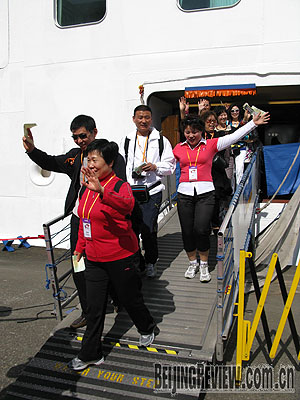| Ties Boosted
Chinese Premier Wen Jiabao held talks with Kim Yong Il, his counterpart from the Democratic People's Republic of Korea (DPRK), in Beijing on March 18.
 |
|
CROSSING THE STRAITS: A group of Chinese mainland tourists visiting Taiwan by passenger liner arrive at Keelung Port on March 16. This is the first group to travel by ship since the mainland and Taiwan launched direct flights and postal and shipping services last December (WANG YAN) | Wen put forth a four-point proposal to enhance ties with the DPRK. It includes maintaining high-level exchanges to cement a political foundation for the relationship and deepening cooperation between the two nations to achieve common development. China will cooperate in various ways with the DPRK in trade and investment, mining exploration and infrastructure.
The proposal also includes strengthening coordination on major international and regional issues and pushing the six-party talks forward. China would like to continue its constructive role in realizing the prohibition of nuclear weapons on the Korean peninsula.
Kim, who was on an official goodwill visit to China, said the DPRK valued its traditional friendship with China and would expand cooperation in all areas.
Farmers on Wheels
The Chinese Government has detailed a stimulus plan that encourages farmers to buy automobiles, which may bring a surge to rural auto sales.
Following a January announcement that the Central Government would float 5 billion yuan ($735 million) to subsidize rural residents who buy automobiles, the Ministry of Finance announced recently the subsidies would comprise 10 percent and 13 percent of the value, respectively, of the purchase price of automobiles and motorcycles.
Farmers who buy light trucks and minivans from March 1 to December 31 will get a 10-percent discount, with the subsidy's ceiling at 5,000 yuan ($735).
No Illegal Surveying
China has planned a crackdown on illegal surveying and mapping, the State Bureau of Surveying and Mapping said on March 15.
The bureau is the only body in China legally allowed to undertake such work, but illegal surveyors have been publishing and selling maps. The bureau said it uncovered 791 cases of illegal surveying and mapping in 2008.
The bureau said it will also crackdown on the illegal production, publication and transmission of geographic information and prevent and prohibit illegal surveying and mapping for military use.
Plagiarism Detective
Chinese academic journals have started using new anti-plagiarism software to cross-check papers after a nationwide spate of plagiarism and academic fraud scandals.
China Academic Journals Electronic Publishing House and Tsinghua Tongfang Knowledge Network Technology Group (TTKN) developed the program, which is named the Academic Misconduct Literature Check.
It was offered to natural science journal editors last December and to college professors on March 12, a TTKN spokesman said.
The software cross-checks academic papers with more than 60 million published articles collected in a database established by Tsinghua University in 1994, Xinhua quoted the spokesman as saying.
The database contains articles from about 7,500 academic journals as well as dissertations, yearbooks and papers given at important seminars. It is regarded as the largest article repository of its kind.
Controversial Tower
A government plan to build the world's tallest river navigation tower on the Yangtze River, China's longest river, in western Chongqing Municipality has sparked an online storm over whether the 10-million-yuan ($1.47 million) tower will be anything more than a showcase project.
The plan, which is still in the feasibility study stage, was first reported on March 12. The city contends the tower is necessary for navigation safety.
Under the plan the tower would be taller than the current world record holder, which is the 68.8-meter Jieyang Tower in south China's Guangdong Province. | 